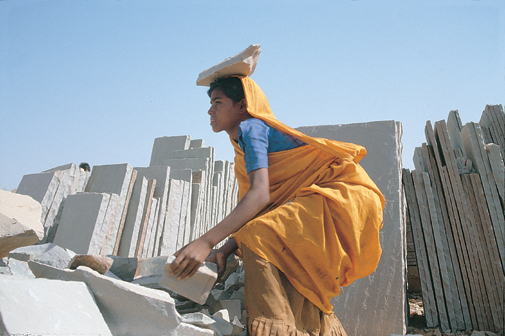
Sustainable purchasing not possible without a fair price
All government purchases and tendering out – totalling 40 billion a year – must be sustainable by 2010. But in practice, the only thing that usually counts in the purchasing policy of municipalities, provinces and the state government is the price.
This appears to be changing, at least in the long term. The Sustainable Trade Initiative (IDH), which was started on 23 October in The Hague, aims to structurally improve the situation in the supply chains of companies. The Sustainable Natural Stone Working Group, in which SOMO is participating, is one of the initiatives supported by the IDH. At the same time, the members of the Working Group are concerned that they will be forced, in practice, to lower their ambitions. The unwillingness of many government purchasers to applying sustainability in practice is impeding the members of the Working Group in realising their objective.
With regard to the natural stone sector, the IDH will support the Sustainable Natural Stone Working Group (WGDN) in concrete improvement programmes to tackle urgent issues in the sector, including child labour, forced labour, low wages and poor working conditions. With this government involvement, the WGDN, which was established at the end of 2005, will develop into a fully fledged multi-stakeholder initiative.
In 2009, the companies which participate in the WGDN will start four trial projects, in which various parties will be involved, both in the Netherlands and in production countries such as India and China. They will select specific chains to increase support for the objectives of the WGDN, including among Indian and Chinese companies. Where possible, concrete improvements will be implemented in quarries and in stone processing, for example improved safety facilities. These trial projects will be followed up in the next few years, in the form of long-term improvement programmes with a more structural approach.
The support of the IDH by the government is of great importance, but the success of the improvement programmes is dependent on sustainable purchasing also being accompanied by ‘the right price’. The companies in the WGDN are often to a large extent dependent on government commissions, and need the support of their customers in order to realise actual sustainability in the chain. As long as government purchasers only look at the lowest price, as is often the case at the moment, the possibilities for implementing real improvements, such as improved wages and no child labour, are limited.
In order to achieve concrete results, the public sector – from the state government down to the municipalities – needs to extract itself from the contradiction of working to achieve sustainability but not wanting to pay the price for it.
The Sustainable Natural Stone Working Group consists of the companies Feikema, Michel Oprey Beisterveld, RMP Grafmonumenten and Beltrami (Belgian), the sector organisations ABN and VNNI, the social organisations COS Nederland and the National India Working Group and the knowledge institutions CREM and SOMO.
For more information on the Sustainable Natural Stone Working Group:
Gerard Oonk, National India Working Group, tel. 030-2321340 or 06-51015260
Related news
-
 CSDDD Datahub reveals law covers fewer than 3,400 EU-based corporate groupsPosted in category:News
CSDDD Datahub reveals law covers fewer than 3,400 EU-based corporate groupsPosted in category:News David Ollivier de LethPublished on:
David Ollivier de LethPublished on: -
 Additional evidence filed against Booking.com for profiting from illegal settlementsPosted in category:News
Additional evidence filed against Booking.com for profiting from illegal settlementsPosted in category:News Lydia de LeeuwPublished on:
Lydia de LeeuwPublished on: -
 The hidden human costs linked to global supply chains in ChinaPosted in category:News
The hidden human costs linked to global supply chains in ChinaPosted in category:News Joshua RosenzweigPublished on:
Joshua RosenzweigPublished on:

